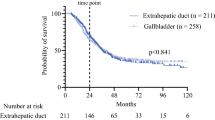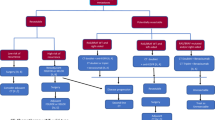Abstract
Introduction
While preoperative chemotherapy is frequently utilized before resection of non-neuroendocrine liver metastases, patients with resectable neuroendocrine liver metastases typically undergo surgery first. FAS is a cytotoxic chemotherapy regimen that is associated with substantial response rates in locally advanced and metastatic pancreatic neuroendocrine tumors.
Methods
All patients who underwent R0/R1 resection of pancreatic neuroendocrine liver metastases at a single institution between 1998 and 2015 were included. The outcomes of patients treated with preoperative FAS were compared with those of patients who were not.
Results
Of the 67 patients included, 27 (40.3%) received preoperative FAS, whereas 40 (59.7%) did not. Despite being associated with higher rates of synchronous disease, lymph node metastases, and larger tumor size, patients who received preoperative FAS had similar overall survival [overall survival (OS), 108.2 months (95% confidence interval (CI) 78.0–136.0) vs. 107.0 months (95% CI 78.0–136.0), p = 0.64] and recurrence-free survival [RFS, 25.1 months (95% CI 23.2–27.0) vs. 18.0 months (95% CI 13.8–22.2), p = 0.16] as patients who did not. Among patients who presented with synchronous liver metastases (n = 46), the median OS [97.3 months (95% CI 65.9–128.6) vs. 65.0 months (95% CI 28.1–101.9), p = 0.001] and RFS [24.8 months (95% CI 22.6–26.9) vs. 12.1 months (2.2–22.0), p = 0.003] were significantly greater among patients who received preoperative FAS compared with those who did not.
Conclusions
The use of FAS before liver resection is associated with improved OS compared with surgery alone among patients with advanced synchronous pancreatic neuroendocrine liver metastases.




Similar content being viewed by others
References
Cloyd JM, Poultsides GA. Non-functional neuroendocrine tumors of the pancreas: advances in diagnosis and management. World J Gastroenterol. 2015;21(32):9512–25.
Modlin IM, Lye KD, Kidd M. A 5-decade analysis of 13,715 carcinoid tumors. Cancer. 2003;97(4):934–59.
Touzios JG, Kiely JM, Pitt SC, et al. Neuroendocrine hepatic metastases: does aggressive management improve survival? Ann Surg. 2005;241(5):776–83.
Mayo SC, de Jong MC, Bloomston M, et al. Surgery versus intra-arterial therapy for neuroendocrine liver metastasis: a multicenter international analysis. Ann Surg Oncol. 2011;18(13):3657–65.
Saxena A, Chua TC, Perera M, Chu F, Morris DL. Surgical resection of hepatic metastases from neuroendocrine neoplasms: a systematic review. Surg Oncol. 2012;21(3):e131–41.
Fairweather M, Swanson R, Wang J, et al. Management of neuroendocrine tumor liver metastases: long-term outcomes and prognostic factors from a large prospective database. Ann Surg Oncol.2017.
Brouquet A, Abdalla EK, Kopetz S, et al. High survival rate after two-stage resection of advanced colorectal liver metastases: response-based selection and complete resection define outcome. J Clin Oncol. 2011;29(8):1083–90.
Kopetz S, Chang GJ, Overman MJ, et al. Improved survival in metastatic colorectal cancer is associated with adoption of hepatic resection and improved chemotherapy. J Clin Oncol. 2009;27(22):3677–83.
Martel G, Hawel J, Rekman J, et al. Liver resection for non-colorectal, non-carcinoid, non-sarcoma metastases: a multicenter study. PloS One. 2015;10(3):e0120569.
Broder LE, Carter SK. Pancreatic islet cell carcinoma. II. Results of therapy with streptozotocin in 52 patients. Ann Intern Med. 1973;79(1):108–18.
Moertel CG, Hanley JA, Johnson LA. Streptozocin alone compared with streptozocin plus fluorouracil in the treatment of advanced islet-cell carcinoma. N Engl J Med. 1980;303(21):1189–94.
Moertel CG, Lefkopoulo M, Lipsitz S, Hahn RG, Klaassen D. Streptozocin-doxorubicin, streptozocin-fluorouracil or chlorozotocin in the treatment of advanced islet-cell carcinoma. N Engl J Med. 1992;326(8):519–23.
Kouvaraki MA, Ajani JA, Hoff P, et al. Fluorouracil, doxorubicin, and streptozocin in the treatment of patients with locally advanced and metastatic pancreatic endocrine carcinomas. J Clin Oncol. 2004;22(23):4762–71.
Rivera E, Ajani JA. Doxorubicin, streptozocin, and 5-fluorouracil chemotherapy for patients with metastatic islet-cell carcinoma. Am J Clin Oncol. 1998;21(1):36–8.
Prakash L, Bhosale P, Cloyd J, et al. Role of Fluorouracil, doxorubicin, and streptozocin therapy in the preoperative treatment of localized pancreatic neuroendocrine tumors. J Gastrointest Surg. 2017;21(1):155–63.
Edge S, Byrd D, Compton C. AJCC Cancer Staging Manual, 7th edn. New York: Springer; 2010.
Dindo D, Demartines N, Clavien P-A. Classification of surgical complications: a new proposal with evaluation in a cohort of 6336 patients and results of a survey. Ann Surg. 2004;240(2):205–13.
Chu QD, Hill HC, Douglass HO, et al. Predictive factors associated with long-term survival in patients with neuroendocrine tumors of the pancreas. Ann Surg Oncol. 2002;9(9):855–62.
Devata S, Kim EJ. Neoadjuvant chemotherapy with capecitabine and temozolomide for unresectable pancreatic neuroendocrine tumor. Case Rep Oncol. 2012;5(3):622–6.
Kaemmerer D, Prasad V, Daffner W, et al. Neoadjuvant peptide receptor radionuclide therapy for an inoperable neuroendocrine pancreatic tumor. World J Gastroenterol. 2009;15(46):5867–70.
Sowa-Staszczak A, Pach D, Chrzan R, et al. Peptide receptor radionuclide therapy as a potential tool for neoadjuvant therapy in patients with inoperable neuroendocrine tumours (NETs). Eur J Nucl Med Mol Imaging. 2011;38(9):1669–74.
van Vliet EI, van Eijck CH, de Krijger RR, et al. Neoadjuvant treatment of nonfunctioning pancreatic neuroendocrine tumors with [177Lu-DOTA0,Tyr3] Octreotate. J Nucl Med. 2015;56(11):1647–53.
Ezziddin S, Lauschke H, Schaefers M, et al. Neoadjuvant downsizing by internal radiation: a case for preoperative peptide receptor radionuclide therapy in patients with pancreatic neuroendocrine tumors. Clin Nucl Med. 2012;37(1):102–4.
Stoeltzing O, Loss M, Huber E, et al. Staged surgery with neoadjuvant 90Y-DOTATOC therapy for down-sizing synchronous bilobular hepatic metastases from a neuroendocrine pancreatic tumor. Langenbecks Arch Surg. 2010;395(2):185–92.
Sowa-Staszczak A, Hubalewska-Dydejczyk A, Tomaszuk M. PRRT as neoadjuvant treatment in NET. Recent Results Cancer Res Fortschritte Krebsforsch Progres Dans Rech Sur Cancer. 2013;194:479–85.
Perysinakis I, Aggeli C, Kaltsas G, Zografos GN. Neoadjuvant therapy for advanced pancreatic neuroendocrine tumors: an emerging treatment modality? Horm Athens Greece. 2016;15(1):15–22.
Acknowledgment
The authors recognize Ms. Ruth Haynes for administrative support in the preparation of this manuscript.
Disclosure
None of the authors have any conflicts of interest associated with this study.
Author information
Authors and Affiliations
Corresponding authors
Electronic supplementary material
Below is the link to the electronic supplementary material.
Rights and permissions
About this article
Cite this article
Cloyd, J.M., Omichi, K., Mizuno, T. et al. Preoperative Fluorouracil, Doxorubicin, and Streptozocin for the Treatment of Pancreatic Neuroendocrine Liver Metastases. Ann Surg Oncol 25, 1709–1715 (2018). https://doi.org/10.1245/s10434-018-6468-8
Received:
Published:
Issue Date:
DOI: https://doi.org/10.1245/s10434-018-6468-8




